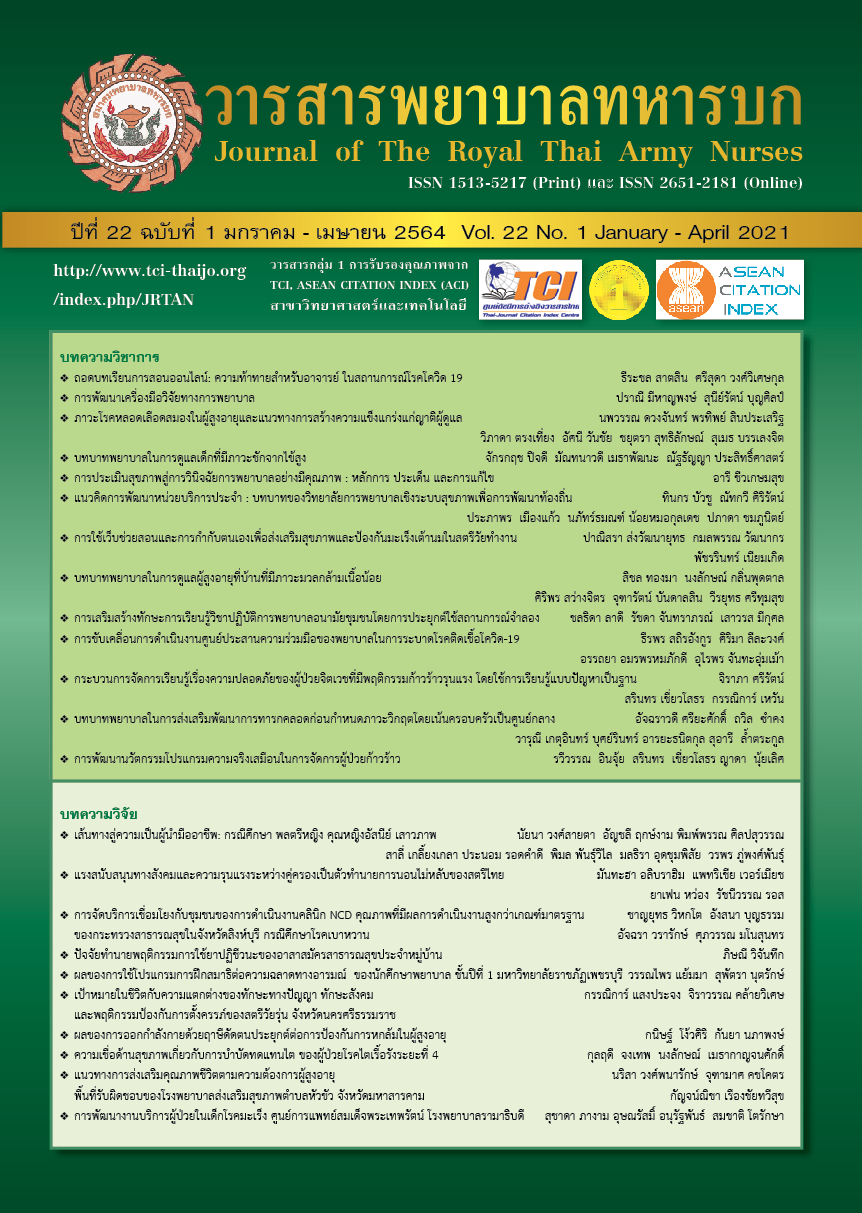Development The Model of Paternal Involvement in Early Childhood Development: Case Study in Nong Ya Plong district Phetchaburi Province
Keywords:
development on the model, paternal involvement, child development, early childhoodAbstract
This research and development aimed to study 1) situational analysis of paternal involvement in early childhood development 2) development the model of paternal involvement in early childhood development 3) assessment the effectiveness of the model of paternal involvement in early childhood development and 4) the paternal satisfaction in the program and guideline of paternal involvement in early childhood development. The participants consisted of 104 fathers; whose children studied in children development centers and 24 healthcare providers in primary care centers and teachers in child development centers. The design was quantitative and qualitative study. Three validated, self-reported questionnaires, semi-structure interview, and try out the model of paternal involvement in early childhood development were used for data collection. The results revealed the overall knowledge mean score (52.88 percent) of paternal in early childhood development was in low-level. The practical mean score (40.38 percent) of paternal in early childhood development was in medium level. The overall behavior of the participation of paternal in early childhood development was in medium level ( = 3.50, SD = .65).
Regarding the effectiveness of the model of paternal involvement in early childhood development, the average mean scores of knowledges, practical, and participation of paternal in early childhood development of the experimental group were higher than the control group with statistically significant differences (p < .001). These findings provide healthcare professionals and teachers in child development centers should encourage paternal to participate in early childhood development by integrated the model in activities. For example, encourage paternal to evaluate child development or participation of paternal in the meeting.
Downloads
References
Bureau of Health Promotion Department of Health. Factors effecting to child development in Thailand in 2017. Nonthaburi, CG Tool Company; 2018. (in Thai)
Walker SP, Wachs TD, Grantham-McGregor S, Black MM, Nelson CA, Huffman SL, Baker-Henningham H., Richter L. Inequality in early childhood: risk and protective factors for early child development, The Lancet 2011; 378 (9799):1325-1338.
Ministry of Public Health. Developmental Surveillance and Promotion Manual; DSPM. Bangkok, The Agricultural Co-operative Federation of Thailand; 2017. (in Thai)
Office of the National Economic and Social Development Council. National strategy 2018-2037. Bangkok, Office of the National Economic and Social Development Council; 2018. (in Thai)
World Health Organization. Thrive nurturing care for early childhood development. WHO: Geneva; 2019.
National institute of child health Department of Health Ministry of Public Health. Thai child development project report. Bangkok, The Agricultural Co-operative Federation of Thailand; 2018. (in Thai)
Ministry of Public Health. Health Data center report. Ministry of public Health: Nonthaburi; 2019. (in Thai)
Tapruk S, Mukdakaseam P, Seubnuch J, Jaturapornpoem J. The study of caregivers and community participation about childcare factors to promotion of child growth and development on the Regional Health Promotion Centers 4 and 5. Regional Health Promotion Center 9 Journal 2017; 11(25): 21-42. (in Thai)
Kaewlee P. Factors related to Childhood Development in Ubon Ratchathani Municipality. Proceeding of the 1st national conference RTUNC; 2016 July 29; Ubonratchathani, Thailand; 2016. (in Thai)
Cabrera NJ, Volling B L, Barr R. Fathers are parents, too! Widening the lens on parenting for children’s development. Child Development Perspectives 2018;12(3):152-157.
Fletcher R. The Dad Factor: How the Father-Baby Bond Helps a Child for Life. Warriewood, NSW: Finch Publishing, 2011.
Meerod C. Effect of training program to enhance child development on knowledge, practice of mothers with children aged one to three years old. [dissertation]. Bangkok: Mahidol University ; 2007. (in Thai)
Chuenta C, Kaewsai S, Saelim S, Kampa P. Development of integrated surveillance and promotion of early childhood development in child care centers, Yasothon province. Research report Yasothorn Provincial Public Health Office, Yasothorn; 2018. (in Thai)
Jundaboot W, Yoosook W, Semrum W. Development guideline for promotion of pre-schoolers in child development center, Sewichian municipal district, Numyuen district Ubon Ratchathani province. Journal of Edu Res Faculty of Edu Srinakharinwirot University 2019; 13 (1): 208-219. (in Thai)
Ponmark J, Thisara P, Weiangkham D, Duangpanya A. Development of a family participation model for promoting child development: A Case study of Ban Sanpamuang child care center, Mueang district, Phayao province. Journal of The Royal Thai Army Nurses 2019; 20(2): 241-250. (in Thai)
Epstein JL, Coates L, Salinas KC, Sanders MG, Simon BS. School, family and community partnerships: Your handbook for action. Thousand Oaks: Corwin Press; 1977.
Bandura, A. Social Foundations of Thoughtand Action: A Social Cognitive Theory. 1986 Englewood Cliffs, NJ: Prentice-Hall.
Yakaew C, Siriprichayakorn R, Yok-in J, Promlek A, Piyajitti A. Behavioral the participation of parents in the promotion of early childhood learning the child development center eastern region. Journal of Education and Journal of Education and Human Development Sciences Human Development Sciences 2018; 2(2):1-14. (in Thai)
Lemeshow S, Hosmer DW, Klar J, Lwanga SK, World Health Organization. Chichester: John Wiley & Sons Ltd; 1990.
Thanasiriluk N, Pomla W, Mahuwan A, Chanwithitkul A. The effective to a program of promotion of early childhood development in Pathumthani province. Journal of Pacific Institute of Management Sci 2017; 4(1): 76-84. (in Thai)
Regional Health Center 5. Effectiveness of developmental programs for children aged 3-5 years. Research report Regional Health Center 5, Ratchaburi; 2019. (in Thai)
Downloads
Published
How to Cite
Issue
Section
License
บทความหรือข้อคิดเห็นใดใดที่ปรากฏในวารสารพยาบาลทหารบกเป็นวรรณกรรมของผู้เขียน ซึ่งบรรณาธิการหรือสมาคมพยาบาลทหารบก ไม่จำเป็นต้องเห็นด้วย
บทความที่ได้รับการตีพิมพ์เป็นลิขสิทธิ์ของวารสารพยาบาลทหารบก
The ideas and opinions expressed in the Journal of The Royal Thai Army Nurses are those of the authors and not necessarily those
of the editor or Royal Thai Army Nurses Association.






